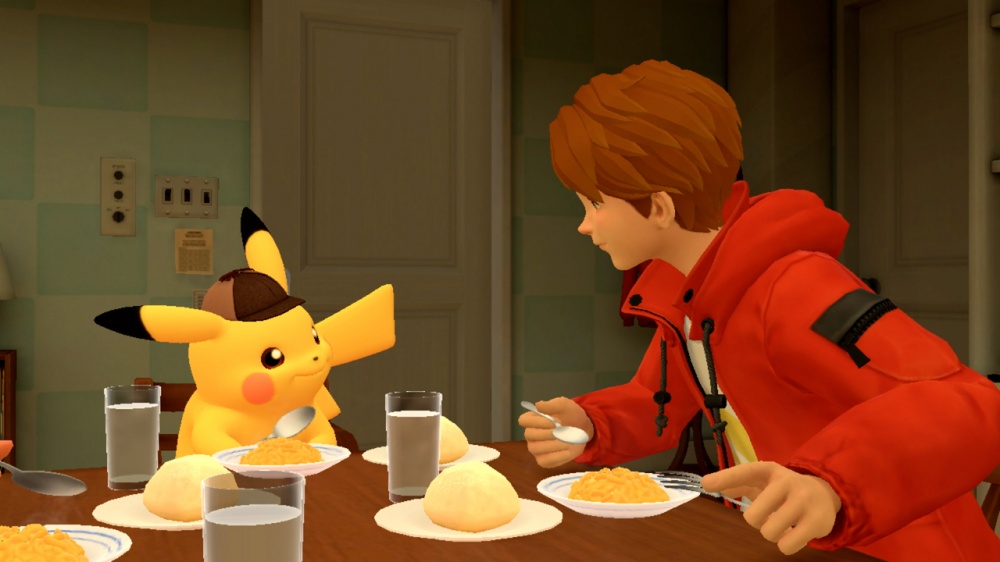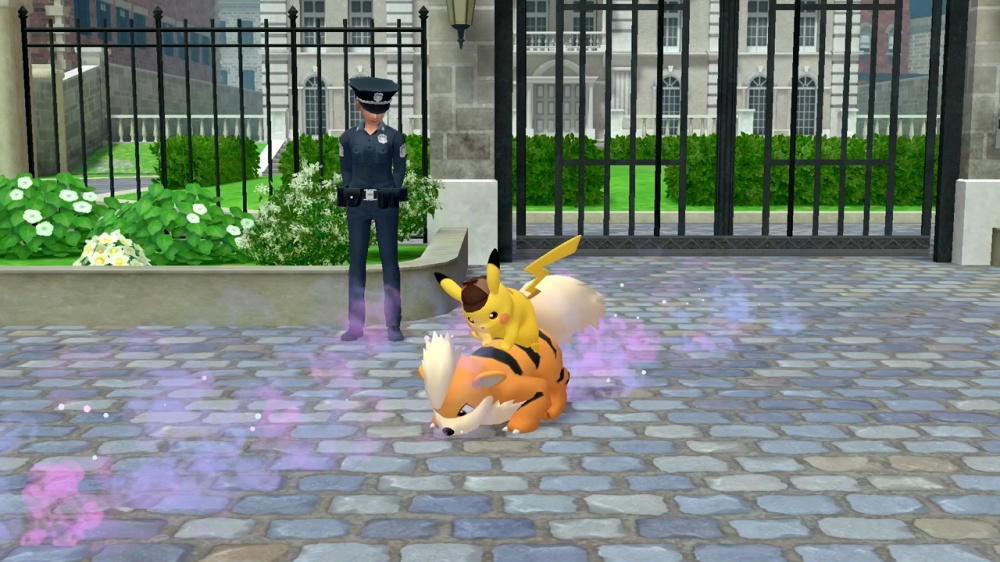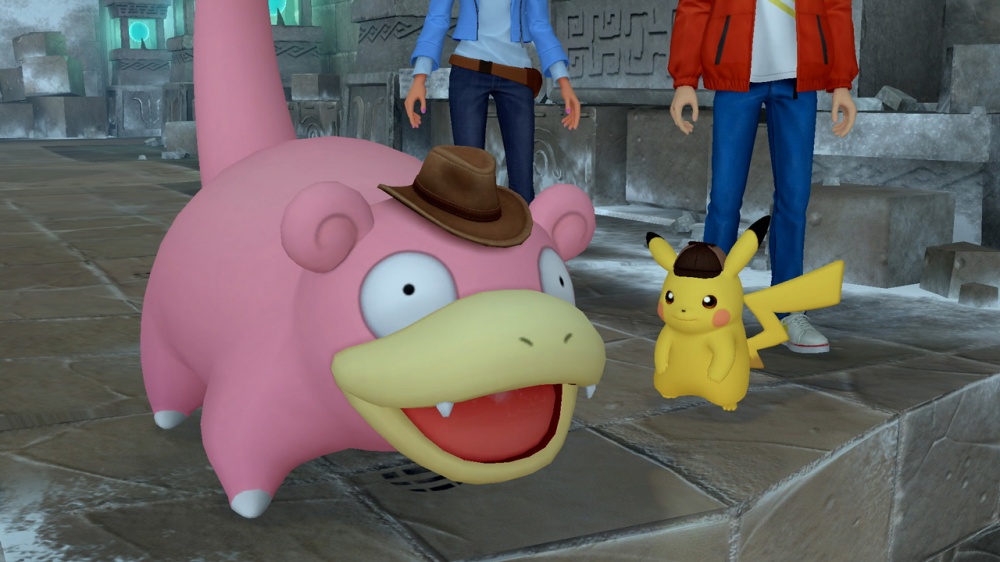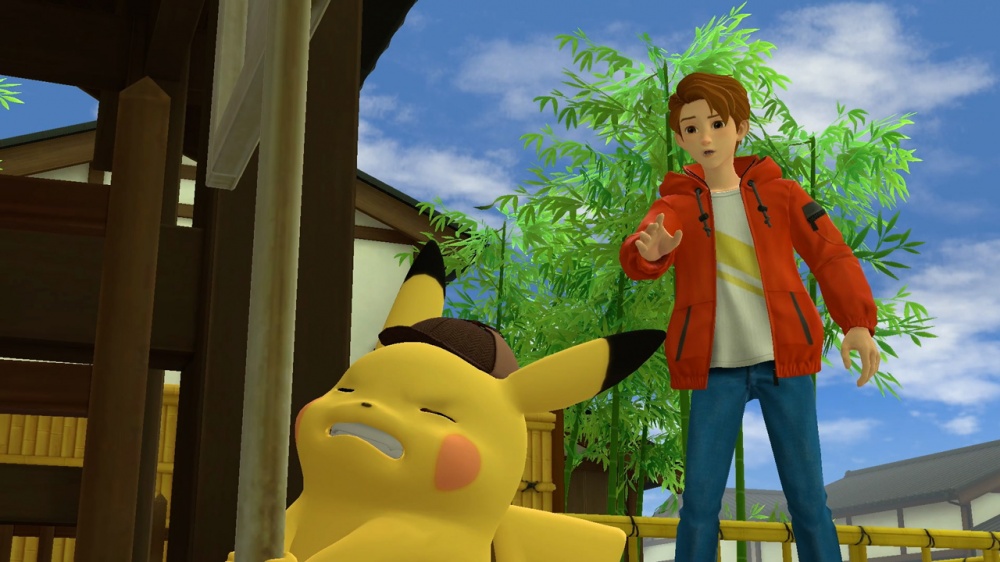System: Switch
Release date: October 6, 2023
Developer: Creatures
Publisher: Nintendo
Detective Pikachu first released in Japan in 2016, although it wouldn’t be until two years later that western audiences would get their hands on the game. It might be an exaggeration to say that it was a bolt of brilliance, but it clearly left enough of a lasting impact to warrant a sequel on the Switch to tie up loose ends in the plot. The aptly named Detective Pikachu Returns is more of the same, and although for many it will be a game that has arrived a little too late (especially if you’ve seen the movie) it is a game with an abundance of charm that is an easy recommendation to make for younger players and for those looking to kick back, relax, and watch a gruff, overdramatic, coffee-loving Pikachu get himself into all manner of trouble and save the day with his deductive reasoning skills. With a little help from Tim, of course.
Detective Pikachu Returns is set two years after the events of the previous game, and begins with the titular Detective Pikachu and his partner, Tim Goodman, receiving an award from the Mayor of Ryme City at the start of “Pokemon Friendship Week” for their services to the city during the incidents that took place two years ago. The festivities are unfortunately interrupted by an unusually aggressive Corviknight, which steals Pikachu’s signature hat before flying off. After a brief tutorial style case which tasks you with retrieving it, the game proceeds with a series of seemingly unconnected cases that tie into a broader narrative mystery that will gradually reveal itself as you progress, and will provide the conclusion that fans will have been waiting for the last five years.
If you’ve played the previous Detective Pikachu, or perhaps any of the Ace Attorney titles, you’ll be familiar with the narrative style here, and I felt that it worked well, with each case providing an enjoyable and relatively complete standalone story whilst drip-feeding snippets of information that made the final case feel like a natural coming together of all the events that had taken place up to that point. The writing is never particularly clever or elaborate, and it’s easy to deduce the answer to each case and the ultimate culprit as you progress. But there is a satisfying sense of progression that makes it feel as though you are actually solving the case, rather than stumbling into the answer through process of elimination, or simply having the answers handed to you (although this is actually an option included in settings) and there is a good pacing to each case and a surprising lack of linearity: a lot of lines of thought will lead to dead ends, or become relevant later in the case once you’ve uncovered another piece of information.

The gruff, eccentric, and comically overconfident Detective Pikachu feels like a protagonist from a Saturday morning cartoon, and I found that this dialogue and antics were more than sufficiently entertaining enough to make up for the relative lack of personality in the rest of the small cast. Although you’ll be playing as Tim Goodman for most of the game, Pikachu is the star of the show, and there is a huge amount of personality in both his actions and his voice acting. The game will often throw you into short cutscenes to introduce new Pokemon and characters, although an equal number are devoted to Pikachu getting himself into a situation which he tries and often fails to handle with dignity. There is a lot of humor and emotion packed into the game, which makes the dialogue stand out as enjoyable even if it isn’t particularly complex.
Playing the first game isn’t essential to understanding the events of Detective Pikachu Returns, but there are moments where the game makes vague passing references to past events, which are potentially awkward if you’re not familiar with what transpired. The recap of the events that is given at the start by Pikachu is less than a couple of minutes long and does little to set the scene or contextualize what follows, and there is an unspoken assumption that you’ve already played the first game and are familiar with its story and characters. This is to be expected of a sequel, but I felt that a longer recap, or a way to view what happened in those events in greater detail via an in-game glossary, movie, or other option, would have helped to make this game more accessible for newcomers, especially considering the gap between releases, and that the primary motivation for Tim and Pikachu, to find Tim’s missing father, is carried over from the first game. This game is very much the second half of a single story, and there are elements that newcomers will miss without that knowledge of the first half.
Alongside this reliance on the first game regarding the motivation of its protagonists in particular, Detective Pikachu Returns borrows elements of its story from the movie, which is entirely unconnected to the games but feels like a condensed version of the narrative of both this game and its prequel in hindsight. Although you’ll appreciate the story here more if you’ve played the first game, you may actually appreciate it less if you’ve seen the movie. Although Detective Pikachu Returns never disguises its plot twists to the point that they’ll be shocking revelations to most players, I found that some key moments lost their impact because I’d seen the scene play out in the film, with only a few minor differences.

Detective Pikachu Returns is primarily a story-focused experience, but the gameplay is what drives that narrative forward, as you’ll need to investigate the scene and gather clues in order to uncover the mystery of the current case that you’re working on. This generally involves running around and talking to everyone you meet repeatedly, exhausting all possible conversation options, and then using the information you’ve obtained from this to deduce the answer to key questions that will move the case forward and bring you one step closer to solving the mystery. You’ll often also need to examine a scene for evidence, and will be told once you’ve uncovered all points of interest and need to move on.
The game will also occasionally require you to engage in very basic minigames, including some stealth-based sections where you’ll need to avoid detection from a zoomed-out isometric perspective, or you’ll need to mash the A button repeatedly so Pikachu can accomplish a task. Nothing here is overly challenging however, and is designed more to break up the main task of interviewing NPCs. For older players this might feel unsatisfying, but the game was clearly designed with a younger audience in mind, and there is nothing here that requires any amount of skill to overcome.
Pikachu and Tim will often be unable to solve the case by themselves, and will enlist the help of one of the local Pokemon, which Pikachu will ride on and you’ll get to control directly. I found these parts of the game to be the most enjoyable, as each Pokemon you control has a completely different ability that requires you to do something new and unique: for example, in the first case you’ll get to control Growlithe, who can pick up on scents that you’ll need to follow. These are a welcome reprieve from the investigations, and although the game will inform you when you’ve accomplished what you need to, they inject some much-needed variety into the gameplay, which can become repetitive over time, as you’ll be traipsing back and forth across the area to speak to the same NPCs over and over to ask them different questions.

Outside of the main case each chapter of the game also has Local Concerns, which are completely unconnected to this and are generally activities you can accomplish while you progress. I was disappointed that there wasn’t any kind of in-game reward for doing these and that they mostly consisted of talking to another NPC to help out the first NPC that gave the quest, but found them to be a nice distraction which made the world feel a little more immersive and alive. Some of them will also allow you to utilize the abilities of your Pokemon helpers as well, which was a nice bonus.
There are a lot of interesting accessibility options in Detective Pikachu Returns that make it clear that the focus of the game is the story rather than the gameplay. As well as a “Story Jump” option that lets you skip chapters and is available from the beginning of the game, there is also the option to have the game highlight the correct answer for you from the clues you have available. Given the lack of penalty for picking a wrong answer when deducing this latter option feels like a strange inclusion. Although the game won’t lead you directly to where you need to go if you get stuck, asking Tim or Pikachu for their thoughts will have them tell you very clearly what you need to do in order to progress, although this is often just them repeating previous dialogue that is given once you’ve accomplished a task, so this is not especially helpful. Short of highlighting where you need to go next on an in-game map, the game could not offer clearer direction in most instances, and your next objective is on full display in the corner of your screen at all times. Detective Pikachu Returns seems to acknowledge the need for player interaction in order to be engaging, but clearly wants you to get on with things as quickly and easily as possible so that you can experience the story.

Overall, the lack of challenge and almost excessive amount of hand-holding makes Detective Pikachu Returns feel like a more interactive visual novel, with gameplay serving as an afterthought rather than the primary reason for playing. This is not something that affected my enjoyment of what was presented, but it is something to keep in mind if you’re looking for a more involving and satisfying gameplay experience alongside the story. This is a very easy and very short game, with each chapter only lasting around three hours at most assuming you do every Local Concern and don’t skip any of the dialogue.
Visually Detective Pikachu Returns looks quite outdated, with drab environments that are notably lacking in detail and have an oddly muted color palette at times, even on the Switch OLED screen. Character models have some awkward animations and lack facial expressions, and with the English voice acting there are occasional synchronization issues between those animations and when they stop speaking. It’s understandable that they would want to preserve the look and feel of the 3DS original, but I felt as though more could have been done to make it a more aesthetically pleasing experience, rather than like an upscaled 3DS title. However, the UI is bold and easy to navigate, and there are no notable performance issues: frame rates remain steady, load times are not overly long, and I never experienced any glitches or crashes during my playthrough.
The Verdict

Detective Pikachu Returns is a light-hearted and relaxing experience that tells a good story and has some simple gameplay to break up the story scenes to make the player feel more involved. To get the most out of the game you have to be in the unlikely position of having played the first game but not seen the film, but it’s an easy recommendation to make if you’re a fan of the original title or just looking for a more relaxed game that will let you interact but doesn’t require much investment in to progress. It has very little to offer outside of its charm, but it has an abundance of charm that makes it fun while it lasts.
Detective Pikachu Returns copy provided by the publisher for the purposes of this review.